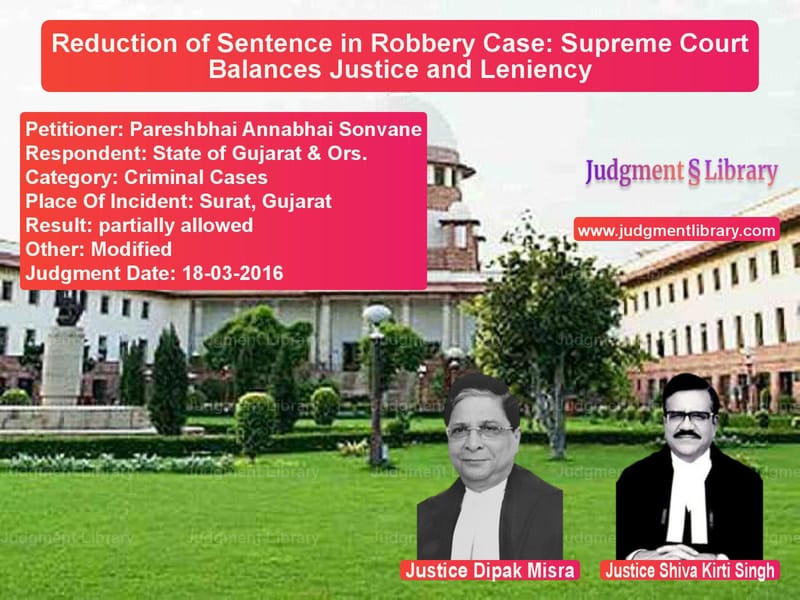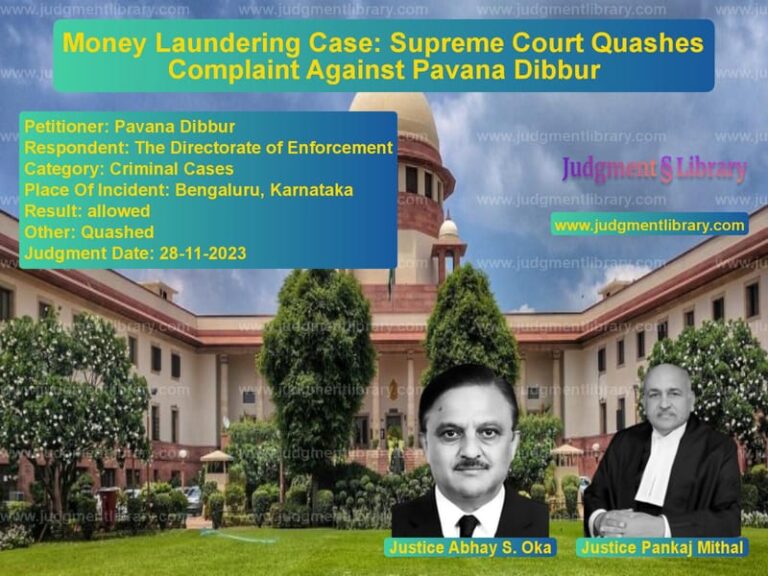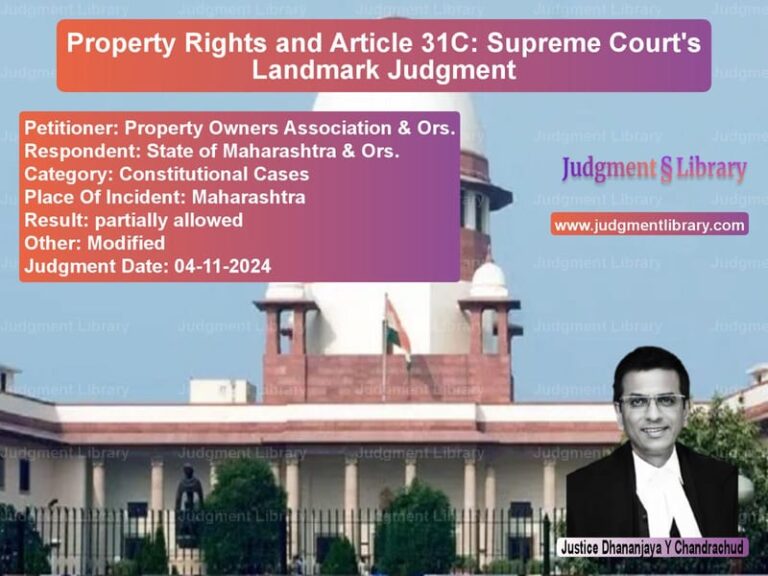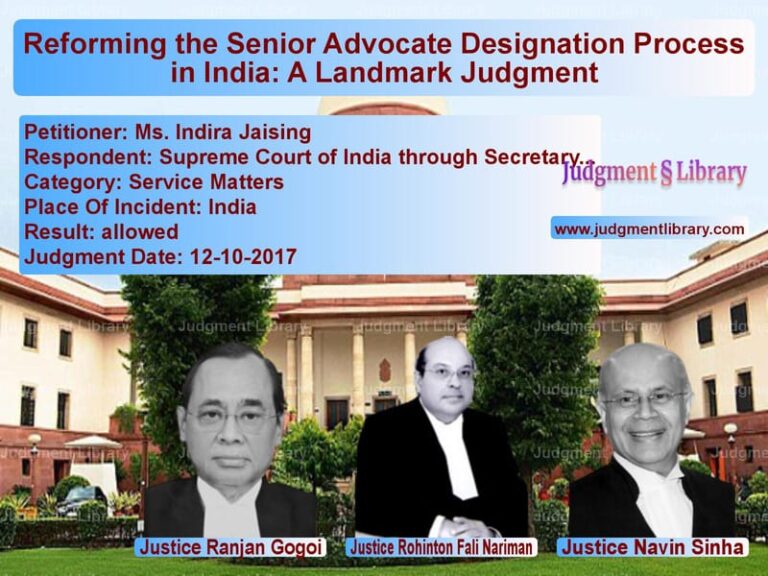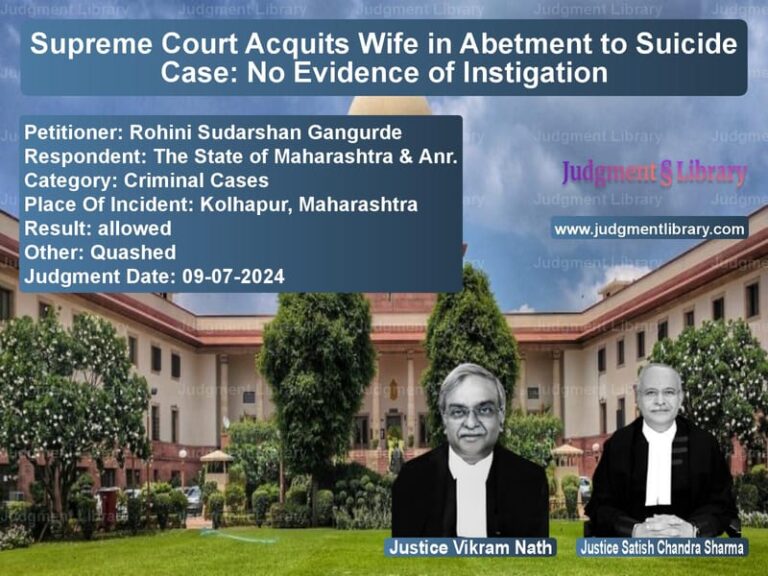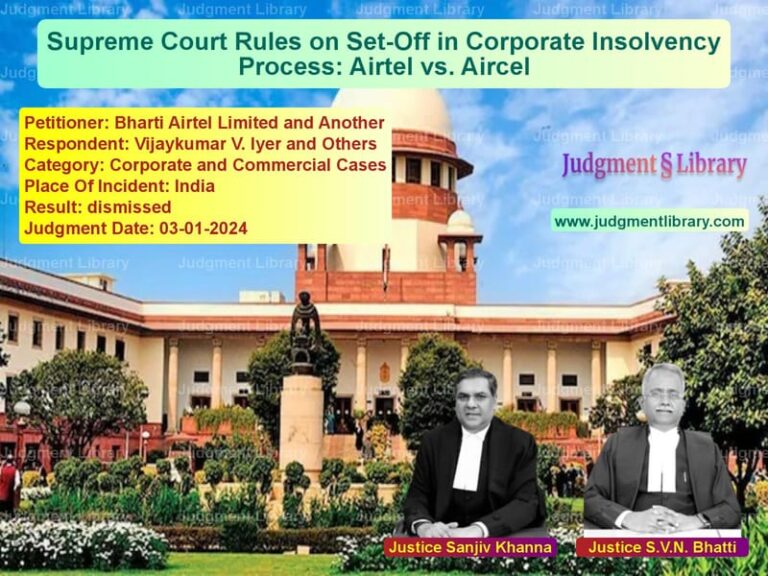Reduction of Sentence in Robbery Case: Supreme Court Balances Justice and Leniency
The Supreme Court of India recently delivered an important judgment in the case of Pareshbhai Annabhai Sonvane vs. State of Gujarat & Ors., where it addressed the issue of sentencing in a robbery case under Section 395 of the Indian Penal Code (IPC). This case highlights the principles of proportionality in sentencing and the consideration of mitigating factors such as the age of the accused and the circumstances of the crime.
Background of the Case
The appellant, Pareshbhai Annabhai Sonvane, was accused No. 2 in a robbery case tried before the Sessions Court, Surat. He, along with three co-accused, was charged under Sections 395 (dacoity), 397 (robbery with a weapon), and 504 (intentional insult to provoke breach of peace) of the IPC. The trial court found that there was sufficient evidence against three of the accused, including the appellant, to convict them under Section 395, but the charges under Sections 397 and 504 were not proven.
The trial court took into consideration several mitigating factors, including:
- The young age of the accused.
- The relatively low value of the looted items, which included cash and a mobile phone worth Rs. 16,550.
- The lack of evidence to prove the use of a weapon.
As a result, the trial court sentenced the accused to only one year of rigorous imprisonment along with a fine of Rs. 100.
Appeal by the State of Gujarat
The State of Gujarat was dissatisfied with the leniency of the sentence and filed Criminal Appeal No. 1463 of 2011 before the Gujarat High Court under Section 377 of the Code of Criminal Procedure (CrPC) seeking enhancement of the sentence.
The High Court, upon reviewing the trial court’s findings, upheld the conviction but found the sentence to be too lenient. It enhanced the sentence from one year to five years of rigorous imprisonment while maintaining the fine imposed by the trial court.
Appeal Before the Supreme Court
Aggrieved by the High Court’s decision to enhance the sentence, the appellant approached the Supreme Court. His primary contentions were:
- The trial court had already considered mitigating factors, including his young age and lack of prior criminal record.
- The enhanced sentence was disproportionate given that the value of the stolen property was relatively low.
- He had already served more than three years in prison, which was sufficient punishment under the circumstances.
Arguments by the Respondents (State of Gujarat)
The State of Gujarat argued that:
- The crime involved a group of individuals committing robbery, which is a serious offense under Section 395 of the IPC.
- The trial court had imposed an exceptionally lenient sentence, which could set a bad precedent.
- The law prescribed a higher punishment for dacoity, and the High Court was correct in increasing the sentence.
Supreme Court’s Observations
After carefully considering the arguments from both sides, the Supreme Court observed:
- The conviction under Section 395 IPC was justified based on the evidence presented.
- The High Court was correct in holding that the trial court’s sentence was lenient, but the enhancement to five years of rigorous imprisonment required reconsideration.
- The accused had already served three years and two months in prison, which was a significant period of incarceration given the nature of the crime.
The Supreme Court further noted:
“We are persuaded to reduce the sentence of imprisonment. We have been informed on the basis of facts mentioned in the Surrender Certificate dated 19.02.2016 available on record that the appellant has now remained in jail for three years and two months on account of continuous incarceration since his surrender on 28.07.2008. The certificate further discloses that the fine of Rs.100/- has also been paid. In the facts of the case and considering the period already undergone by the appellant, we reduce the period of sentence imposed upon the appellant to the period already undergone.”
Final Judgment and Its Implications
The Supreme Court allowed the appeal to the extent of reducing the sentence to the period already undergone, i.e., three years and two months of actual imprisonment. The Court directed that, unless the appellant was required in any other case, he should be released forthwith.
This ruling highlights the Supreme Court’s balanced approach to criminal sentencing, ensuring that while serious offenses are dealt with strictly, mitigating factors such as young age, absence of prior criminal history, and the proportionality of punishment are also given due consideration.
Conclusion
The Supreme Court’s decision in this case reinforces the principle of proportionality in sentencing. While upholding the conviction, it exercised judicial discretion to ensure that the punishment did not exceed what was necessary to meet the ends of justice. This ruling serves as an important precedent in criminal jurisprudence, particularly in cases where the accused have already undergone substantial imprisonment.
Don’t miss out on the full details! Download the complete judgment in PDF format below and gain valuable insights instantly!
Download Judgment: Pareshbhai Annabhai vs State of Gujarat & O Supreme Court of India Judgment Dated 18-03-2016-1741853934573.pdf
Direct Downlaod Judgment: Direct downlaod this Judgment
See all petitions in Bail and Anticipatory Bail
See all petitions in Attempt to Murder Cases
See all petitions in Fraud and Forgery
See all petitions in Judgment by Dipak Misra
See all petitions in Judgment by Shiva Kirti Singh
See all petitions in partially allowed
See all petitions in Modified
See all petitions in supreme court of India judgments March 2016
See all petitions in 2016 judgments
See all posts in Criminal Cases Category
See all allowed petitions in Criminal Cases Category
See all Dismissed petitions in Criminal Cases Category
See all partially allowed petitions in Criminal Cases Category

